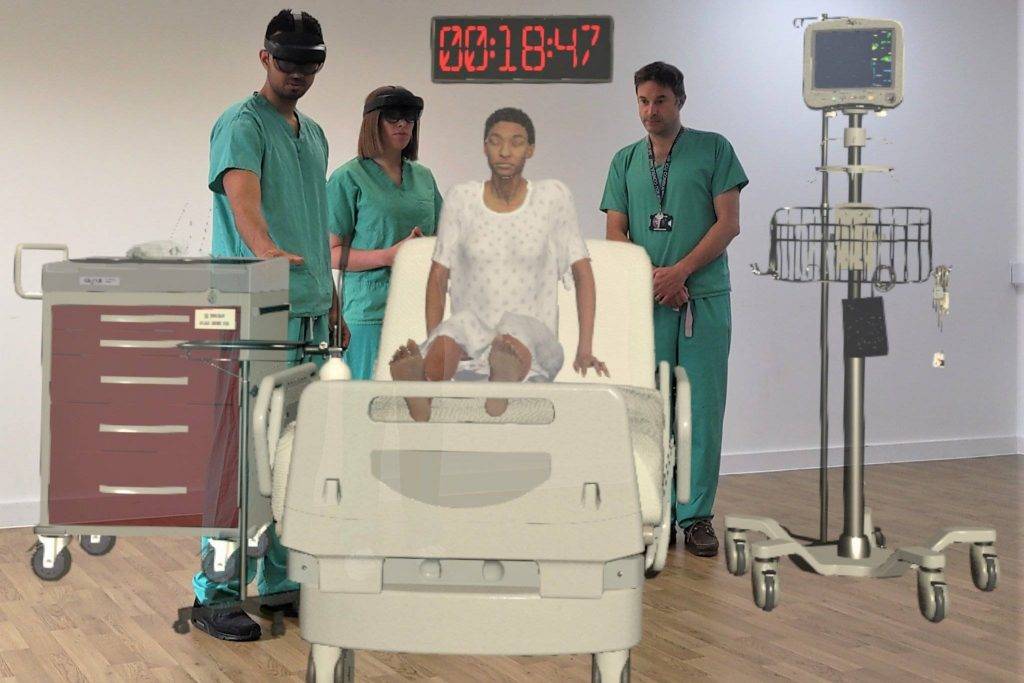NUS Medicine has partnered with technology company GigXR to provide holographic healthcare training. They will deliver holographic clinical scenarios for gastroenterology training.
The gastrointestinal module will be conducted through an application.
Holography Meets Medicine
The collaboration introduces ‘HoloScenarios: Gastrointestinal,’ a sophisticated module employing holographic technology to facilitate interactive learning for medical and nursing students, enhancing their diagnostic and treatment skills in acute gastrointestinal diseases.
Beyond Conventional Methods
Departing from standard virtual reality (VR) methods, the mixed reality (MR) technology in HoloScenarios offers a more comprehensive educational experience, enabling students to engage in lifelike patient care scenarios.
The Impact of Mixed Reality
Associate Professor Alfred Kow from NUS Medicine highlights the importance of this technological shift. He stated “This module will allow learners to form a deeper understanding and appreciation of the gastrointestinal tract, especially the three-dimensional understanding of anatomy and body functions”.
From Virtual to Reality
While VR has been instrumental in medical training, its capabilities are somewhat restricted. MR’s immersive approach fosters a more rounded skill set, preparing students for the complexities of real-world medical practice.
Safety and Realism in Training
The holographic training environment, free from physical risks, focuses on experiential learning. The platform allows hologram interaction, mimicking real-life clinical settings, and enhancing student confidence and competence.
Additionally, the new module enhances realism in training, enabling learners to diagnose and treat acute gastrointestinal diseases more accurately.
Education with Practical Application
Dr. Gao Yujia, associated with the National University Health System, emphasises the module’s practical implications. “With HoloScenarios: Gastrointestinal, learners will have the ability to not only visualise the presentation of a given disease in 3D but better understand how to apply key learnings in the clinical context and within team environments,” he said, underscoring the importance of practical application in medical training.
Diverse Learning Scenarios
The module addresses a range of gastrointestinal emergencies. It also challenges students to apply their knowledge in diverse, critical situations, promoting a deeper understanding of complex medical issues. Additionally, HoloScenarios’ compatibility with multiple devices makes it globally accessible, ensuring various medical conditions can be studied and understood universally, surpassing geographical limitations.
Collaboration for Greater Reach
GigXR’s CEO, Jared Mermey, recognises the value of collaborative expertise. “We are immensely proud to partner with NUS Medicine which has been at the forefront of adopting mixed reality in both clinical and educational use cases. By bringing their esteemed expertise onto our platform with the co-creation of HoloScenarios’ newest module, we believe clinical breakthroughs in diagnosing and treating gastrointestinal diseases will take a giant leap forward,” he states.
GigXR founder, David King Lassman, discusses the platform’s growing offerings. “HoloScenarios: Gastrointestinal marks the latest milestone in our rapidly expanding catalogue, which now boasts a dozen different licensable training modules that span holographic simulated patients, clinical scenarios, anatomy, pathophysiology, and 3D medical imaging,” he explains.
Partnerships Driving Innovation
NUS joins other institutions currently using the software. They include the University of Cambridge, the University of Michigan, and Morlen Health. Lastly, the much-anticipated HoloScenarios: Gastrointestinal module is slated for release in Spring 2024.

